- Clone
- W15101A (See other available formats)
- Regulatory Status
- RUO
- Other Names
- Epidermal growth factor module-containing mucin-like receptor 2, EMR2, AGRE2, ADGRE2
- Isotype
- Rat IgG2a, κ
- Barcode Sequence
- GGATGTACCTATGGT
- Ave. Rating
- Submit a Review
- Product Citations
- publications
CD312, also known as Epidermal growth factor module-containing mucin-like receptor 2 (EMR2), is a 90 kD type I protein, a member of the Epidermal Growth Factor-seven transmembrane (EGF-TM7) family. Its extracellular region consists of five tandem EGF-like adhesion domains and a mucin-like stalk domain containing a G-protein proteolytic site, while the C-terminal region consists of a seven-pass transmembrane domain. CD312 is expressed by myeloid cells, dendritic cells, and activated lymphocytes. CD312 contributes to the interaction of macrophages, dendritic cells and activated T cells with B cells; it is involved in neutrophil chemotaxis, degranulation and adhesion, and release of inflammatory cytokines by macrophages. The ligands of CD312 are the glycosaminoglycans (GAG) chondroitin sulphate, and dermatan sulphate.
Product DetailsProduct Details
- Verified Reactivity
- Human
- Antibody Type
- Monoclonal
- Host Species
- Rat
- Immunogen
- Recombinant protein fragment containing the first extracellular region of human EMR2 (24-540 a.a.).
- Formulation
- Phosphate-buffered solution, pH 7.2, containing 0.09% sodium azide and EDTA
- Preparation
- The antibody was purified by chromatography and conjugated with TotalSeq™-D oligomer under optimal conditions.
- Concentration
- 0.5 mg/mL
- Storage & Handling
- The antibody solution should be stored undiluted between 2°C and 8°C. Do not freeze.
- Application
-
PG - Quality tested
- Recommended Usage
-
Each lot of this antibody is quality control tested by immunofluorescent staining with flow cytometric analysis and the oligomer sequence is confirmed by sequencing. TotalSeq™-D antibodies are compatible with Mission Bio’s Tapestri Single-Cell Sequencing Platform for simultaneous detection of DNA and Protein.
To maximize performance, it is strongly recommended that the reagent be titrated for each application, and that you centrifuge the antibody dilution before adding to the cells at 14,000xg at 2 - 8°C for 10 minutes. Carefully pipette out the liquid avoiding the bottom of the tube and add to the cell suspension. For Proteogenomics analysis, the suggested starting amount of this reagent for titration is ≤ 1.0 µg per million cells in 100 µL volume. Refer to the corresponding TotalSeq™ protocol for specific staining instructions.
Buyer is solely responsible for determining whether Buyer has all intellectual property rights that are necessary for Buyer's intended uses of the BioLegend TotalSeq™ products. For example, for any technology platform Buyer uses with TotalSeq™, it is Buyer's sole responsibility to determine whether it has all necessary third party intellectual property rights to use that platform and TotalSeq™ with that platform. - Additional Product Notes
-
TotalSeq™-D reagents are designed to profile protein expression at single cell level. The Mission Bio Tapestri platform and sequencer (e.g. Illumina analyzers) are required. Please contact technical support for more information, or visit biolegend.com/totalseq/single-cell-dna
The barcode flanking sequences are CGAGATGACTACGCTACTCATGG (PCR handle), and GAGCCGATCTAGTATCTCAGT*C*G (capture sequence). * indicates a phosphorothioated bond, to prevent nuclease degradation.
View more applications data for this product in our Application Technical Notes. - RRID
-
AB_2936586 (BioLegend Cat. No. 373109)
Antigen Details
- Structure
- Member of the Epidermal Growth Factor-seven transmembrane (EGF-TM7) family, type I protein, its extracellular region consists of five tandem EGF-like adhesion domains and a mucin-like stalk domain containing a G-protein proteolytic site; the C-terminal re
- Distribution
-
Expressed by myeloid cells, dendritic cells, and activated lymphocytes.
- Function
- Involved in neutrophil chemotaxis, degranulation and adhesion. Promotes the release of inflammatory cytokines by macrophages. Contributes in the interaction of macrophages, dendritic cells and activated T cells with B cells.
- Ligand/Receptor
- Chondroitin sulphate, dermatan sulphate.
- Cell Type
- Dendritic cells, Lymphocytes, Neutrophils
- Biology Area
- Cell Adhesion, Cell Biology, Immunology
- Molecular Family
- Adhesion Molecules, CD Molecules
- Antigen References
-
1. Boyden SE, et al. 2016. N. Engl. J. Med. 374:656.
2. Lewis SM, et al. 2015. Clin. Exp. Immunol. 182:184.
3. Huang YS, et al. 2012. Mol. Cell Biol. 32:1408.
4. Rutkowski MJ, et al. 2011. J. Neurooncol. 105:165.
5. van Eijk M, et al. 2010. Immunol. Lett. 129:64. - Gene ID
- 30817 View all products for this Gene ID
- UniProt
- View information about CD312 on UniProt.org
Related Pages & Pathways
Pages
Related FAQs
Other Formats
View All CD312 (EMR2) Reagents Request Custom Conjugation| Description | Clone | Applications |
|---|---|---|
| Purified anti-human CD312 (EMR2) | W15101A | FC,IHC-F |
| PE/Cyanine7 anti-human CD312 (EMR2) | W15101A | FC,IHC-F |
| FITC anti-human CD312 (EMR2) | W15101A | FC |
| PE/Dazzle™ 594 anti-human CD312 (EMR2) | W15101A | FC |
| TotalSeq™-D1277 anti-human CD312 | W15101A | PG |
| TotalSeq™-A1277 anti-human CD312 (EMR2) | W15101A | PG |
| TotalSeq™-C1277 anti-human CD312 (EMR2) | W15101A | PG |
| TotalSeq™-B1277 anti-human CD312 (EMR2) | W15101A | PG |
| APC anti-human CD312 (EMR2) | W15101A | FC |
Compare Data Across All Formats
This data display is provided for general comparisons between formats.
Your actual data may vary due to variations in samples, target cells, instruments and their settings, staining conditions, and other factors.
If you need assistance with selecting the best format contact our expert technical support team.
-
Purified anti-human CD312 (EMR2)
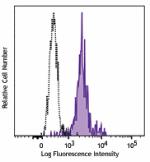
Human peripheral blood monocytes were stained with purified ... 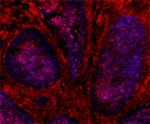
Human frozen tonsil section was fixed with 4% paraformaldehy... -
PE/Cyanine7 anti-human CD312 (EMR2)
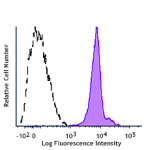
Human peripheral blood monocytes were treated with True-Stai... -
FITC anti-human CD312 (EMR2)
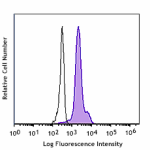
Human peripheral blood monocytes were stained with anti-huma... -
PE/Dazzle™ 594 anti-human CD312 (EMR2)
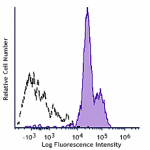
Human peripheral blood monocytes were stained with anti-huma... -
TotalSeq™-D1277 anti-human CD312
-
TotalSeq™-A1277 anti-human CD312 (EMR2)
-
TotalSeq™-C1277 anti-human CD312 (EMR2)
-
TotalSeq™-B1277 anti-human CD312 (EMR2)
-
APC anti-human CD312 (EMR2)

Human peripheral blood mononuclear cells were stained with a...













Follow Us